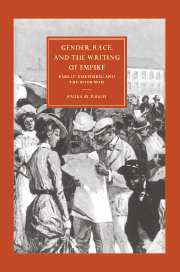Book contents
- Frontmatter
- Contents
- Acknowledgments
- 1 The war at home
- 2 The concentration camps controversy and the press
- 3 Gender ideology as military policy – the camps, continued
- 4 Cannibals or knights – sexual honor in the propaganda of Arthur Conan Doyle and W. T. Stead
- 5 Interpreting South Africa to Britain – Olive Schreiner, Boers, and Africans
- 6 The imperial imaginary – the press, empire, and the literary figure
- Notes
- Works cited
- Index
- CAMBRIDGE STUDIES IN NINETEENTH-CENTURY LITERATURE AND CULTURE
2 - The concentration camps controversy and the press
Published online by Cambridge University Press: 22 September 2009
- Frontmatter
- Contents
- Acknowledgments
- 1 The war at home
- 2 The concentration camps controversy and the press
- 3 Gender ideology as military policy – the camps, continued
- 4 Cannibals or knights – sexual honor in the propaganda of Arthur Conan Doyle and W. T. Stead
- 5 Interpreting South Africa to Britain – Olive Schreiner, Boers, and Africans
- 6 The imperial imaginary – the press, empire, and the literary figure
- Notes
- Works cited
- Index
- CAMBRIDGE STUDIES IN NINETEENTH-CENTURY LITERATURE AND CULTURE
Summary
Still reeling from the series of setbacks in December 1899 that came to be known as Black Week, the British army by March 1900 had settled on a new strategy to try to finish the war in South Africa – the war that General Lord Roberts had said would be over by Christmas. Searching for a way to cut off Boer fighters in the field from food and supplies, the British, under the command of Lord Roberts, began to burn the homes and crops of the South African men who were away on commando duty. The farm-burning policy became systematic under Lord Kitchener, who succeeded Roberts as commander-in-chief of the British forces in South Africa in December 1900. Many African settlements and crops in the Orange Free State and the South African Republic (the Transvaal) were added to the list of what was to be “cleared,” and Kitchener was left with the problem of what to do with all the noncombatants thus displaced.
In September of that year General John Maxwell had formed camps for surrendered burghers in Bloemfontein and Pretoria, and on 20 December 1900 Kitchener officially proclaimed a South Africa-wide policy whereby surrendered burghers and their families would be housed and fed in such camps, courtesy of the British military.
- Type
- Chapter
- Information
- Gender, Race, and the Writing of EmpirePublic Discourse and the Boer War, pp. 32 - 54Publisher: Cambridge University PressPrint publication year: 1999



